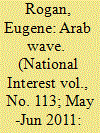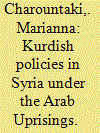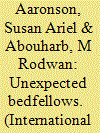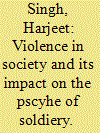| Srl | Item |
| 1 |
ID:
104326


|
|
|
|
|
| Publication |
2011.
|
| Summary/Abstract |
FOR DECADES, the Arab world has lived under a variety of governments whose only point in common was the degree of autocracy they imposed on their citizens. Some blamed Arab culture, others said that Islam was incompatible with popular rule, but most agreed that the Arabs were bucking a global trend of democratization.
|
|
|
|
|
|
|
|
|
|
|
|
|
|
|
|
| 2 |
ID:
137738


|
|
|
|
|
| Summary/Abstract |
The effect of the Arab Uprisings on the interplay of state and non-state entities is revealed as influencing the emergence of multiple players of non-state status pursuing democratic rights, and as attempting to dismiss regional despotism as an intrinsic element of ongoing transition in the Middle East. This article focuses on the positive overall effect on the Kurdish movement of unity and cooperation between KRG and PKK-PYD actors to achieve Kurdish harmony, and as interconnected paradigms vis-à-vis their influence and interaction with regional players. Given the rise of the Kurds in Syria and the KRG’s regional importance as the first actual Kurdish de facto state entity, the PKK’s role appears key for unifying and institutionalising the relatedness of the Kurdish movements in Iraq and Syria. An empirical understanding of the Kurdish case, explained through a conceptual model of ‘multi-dimensional interrelations’, may further clarify how the theoretical framework can be applied to International Relations
|
|
|
|
|
|
|
|
|
|
|
|
|
|
|
|
| 3 |
ID:
107809


|
|
|
|
|
| Publication |
2011.
|
| Summary/Abstract |
The WTO system and democratic rights are unexpected bedfellows. The GATT/WTO requires governments to adopt policies that provide foreign products (read producers) with due process, political participation, and information rights related to trade policymaking. Because these nations also provide these rights to their citizens, a growing number of people are learning how to influence trade-related policies. As trade today encompasses many areas of governance, these same citizens may gradually transfer the skills learned from influencing trade policies to other public issues. Thus, the WTO not only empowers foreign market actors, but also citizens in repressive states. We use both qualitative and quantitative analysis to examine whether membership in the WTO over time leads to improvements in these democratic rights. Our qualitative analysis shows that these issues are discussed during accessions and trade policy reviews. Quantitative analysis examines how members of the GATT/WTO perform on these democratic rights over time. We use a cross-national time series design of all countries, accounting for selection issues of why countries become members of the GATT/WTO regime. We find that longer GATT/WTO membership leads to stronger performance on our metrics for political participation, free and fair elections, and access to information.
|
|
|
|
|
|
|
|
|
|
|
|
|
|
|
|
| 4 |
ID:
105880


|
|
|
|
|
| Publication |
2011.
|
| Summary/Abstract |
The WTO system and democratic rights are unexpected bedfellows. The GATT/WTO requires governments to adopt policies that provide foreign products (read producers) with due process, political participation, and information rights related to trade policymaking. Because these nations also provide these rights to their citizens, a growing number of people are learning how to influence trade-related policies. As trade today encompasses many areas of governance, these same citizens may gradually transfer the skills learned from influencing trade policies to other public issues. Thus, the WTO not only empowers foreign market actors, but also citizens in repressive states. We use both qualitative and quantitative analysis to examine whether membership in the WTO over time leads to improvements in these democratic rights. Our qualitative analysis shows that these issues are discussed during accessions and trade policy reviews. Quantitative analysis examines how members of the GATT/WTO perform on these democratic rights over time. We use a cross-national time series design of all countries, accounting for selection issues of why countries become members of the GATT/WTO regime. We find that longer GATT/WTO membership leads to stronger performance on our metrics for political participation, free and fair elections, and access to information.
|
|
|
|
|
|
|
|
|
|
|
|
|
|
|
|
| 5 |
ID:
106874


|
|
|